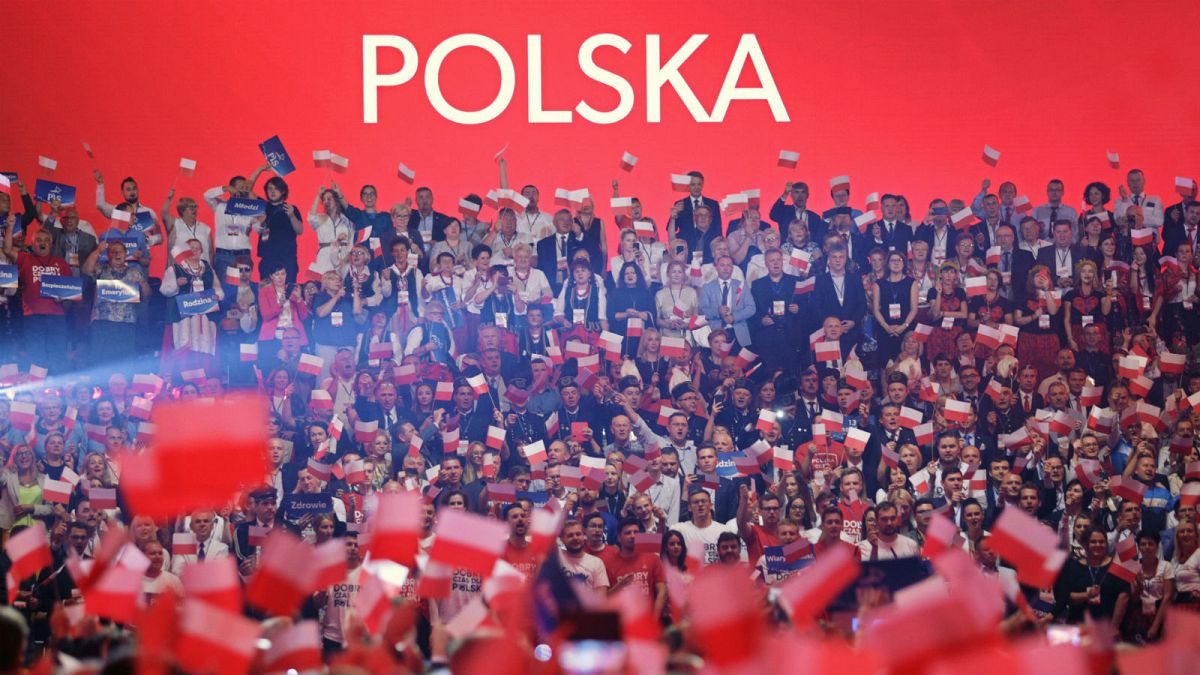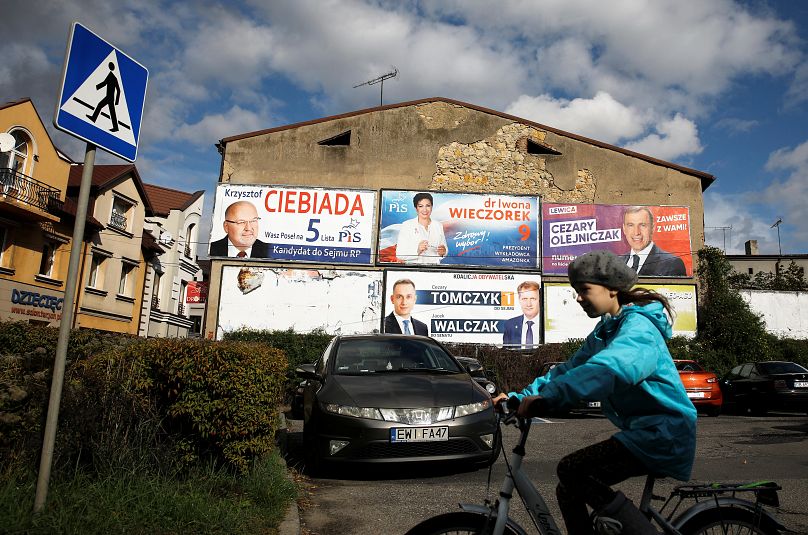Poland's nationalist Law and Justice (PiS) party is set to win Sunday's election, but will it be able to form a majority in parliament?
What's happening?
Poland faces a watershed parliamentary election on Sunday (October 13) as the country's ruling party, the nationalist Law and Justice (PiS) party, seeks to tighten its grip on power with pledges to redistribute wealth more fairly and protect the Christian family model.
Why is it important?
Experts say the election is pivotal because if PiS is re-elected comfortably it would then have a mandate to reshape Poland in its conservative image. It would also embolden the party in its spats with Brussels.
"Poland’s parliamentary election ... is likely to be one of the most important and consequential since the collapse of communism in 1989," wrote Aleks Szczerbiak, professor of politics at the University of Sussex.
"If Law and Justice wins it will entrench and continue to push ahead with its radical reform programme in areas such as the judiciary and probably broaden it out into other fields such as the privately-owned media.
"At the same time, and perhaps even more importantly, a Law and Justice second term will further shake-up the more informal hierarchies of power, influence and prestige that currently exist in the public sphere.
"With a fresh electoral mandate, the party will also be emboldened in its dealings with the EU political establishment and major European powers."
For Piotr Buras, the head of the Warsaw office of the European Council on Foreign Relations, PiS have been weakening independent institutions like the judiciary and the media in recent years and if they win power again they will renew their attempts to undermine the country's judicial system with another big reform.
Read more: Will the Greens gets their first MPs elected in coal-hungry Poland?
"They would basically be dissolving the whole system and setting it up again, which would allow the ruling party to get rid of all judges who oppose the reforms," Buras said, classifying it as a "very real and dangerous scenario".
According to the Polish politics expert, all elements of the PiS agenda point to a "very dangerous and anti-democratic direction".
"So what we experience now and will be more pronounced after October 13 will be the creation of a very paternalistic, centralistic state, leaving less and less space for citizen actions."
At campaign meetings, however, the leader of the PiS, Jaroslaw Kaczynski, has praised his party's track record over the last four years, saying that the PiS has "succeeded".
"We changed Poland, changed economic policy, social policy, strengthening the state", he said.
"Today's Poland is fairer, more efficiently governed, and developing well. Virtually all social and economic indicators have been good over the past few years, with a tendency to improve despite the not-so-good situation," Kaczynski added.
"Above all, we truly want this prosperity, so that the standard of living of Poles should not be worse than the standard of living of people living west of our borders."
Who are the key parties?
Law and Justice (PiS)
PiS is the country's ruling party, led by Kaczynski.
The conservative, Christian democratic and right-wing populist party's image has been tarnished by recent scandals which led to the resignations of its parliamentary speaker and the deputy justice minister.
Despite regular rows with the EU over rule of law, environmental policy and migrants, the PiS has remained popular in Poland, thanks largely to a social program which includes 500 zloty (€116) handouts for every child in a family. It is now pledging to almost double the minimum wage for workers if re-elected.
The Civic Coalition, with the Civic Platform party (PO)
The PO is the main Polish opposition party. It's also the party of outgoing European Council President Donald Tusk, who was PM from 2007 to 2014. Most surveys putting its support at around 21-28%. The PO is openly pro-EU.
The PO isn't running as a stand-alone party, but in a coalition called The Civic Coalition / Koalicja Obywatelska (KO). PO is the biggest party of the coalition, which also counts the Nowoczesna party and the Greens.
The Left
The Left is a parliamentary coalition made out of the Democratic Left Alliance (SLD), Spring and Lewica Razem and other small left-wing parties such as Your Movement and Polish Socialist Party. The SLD (or Sojusz Lewicy Demokratycznej) is a left-wing party used to be very influential in Poland until the early 2000s when it was brought down by a big corruption scandal and never recovered.
The SLD has no current MPs, and there are currently no left-wing MPs in parliament. The Left coalition hopes that will change after the election.
The Confederation
The Confederation is a far-right coalition established in 2018 with right-wing and far-right parties KORWiN, the National Movement and other parties. It didn't win any seats at the EU election in 2019 and is polling at around 6%.
Polish People’s Party (PSL)
PSL is a rural, anti-establishment party and enjoys about 6% of public support. Its leader, Władysław Kosiniak-Kamysz, is among the most respected across the entire opposition. Hence he is sometimes mentioned as potential future prime minister, should the Law and Justice fail to win 50% of seats in the Sejm following the fall 2019 elections.
Kukiz’15
The Kukiz’15 party was founded during the 2015 parliamentary campaign by rock star Paweł Kukiz, who campaigned on an anti-establishment platform and won 20% of the vote. Some of his party's candidates were far-right politicians, some of them used racial slurs during the campaign. Five were elected to parliament and eventually left the party, which now polls around 6%.
The Kukiz’15 and PSL parties are in an unofficial coalition: many Kukiz’15 members, including Kukiz himself, are running on PSL lists as candidates.
How many seats did Polish parties win in previous elections?
What are some of the key issues?
Welfare
The ruling PiS party, in its relection campaign, has sought to portray itself as championing the welfare state.
Along with its defence of what it sees as traditional Polish values, the party has made increased social spending a key plank of its bid to win the October 13 poll.
PiS plans to raise public healthcare expenditure to 160 billion zlotys (€37 billion) by 2024. In 2016, it was 84.6 billion zlotys (€19.6), according to Poland’s statistics office.
Buras described PiS' model state as a "state-based on treating citizens as clients or consumers, which tries to control more and more of the democratic space and to satisfy citizens with generous direct money transfers as part of social policy programmes," which he said they would call the "Polish model of welfare state" but has little to do with the western European model of the welfare state.
"In Europe, the welfare state is strong because of the strength of public services, which is not the case in Poland," Buras said.
The Polish model is "based on direct transfers to the people but public services are very poor and won't be improved because of a shortage of money and disinterest of the government," he added.
"So the idea is to give money to the people directly and to centralise the governmental power structures, which creates a very Hungarian or Turkish model of the state."
Buras said that PiS' electoral campaign focuses on this model of the welfare state and portraying the opposition as the bloc who would get rid of the social policy programmes introduced in 2015.
LGBT rights
The issue of LGBT rights has been a divisive feature of the election campaign.
Gay pride marches are given police protection due to the threat of violence, especially from far-right supporters.
Unlike the majority of EU countries, civil partnerships and marriage for same-sex couples are illegal in Poland.
The ruling PiS want to keep it that way.
"Family is one woman, one man, in a permanent relationship and their children," said Kaczynski.
Kaczynski has also denounced homosexuality as an ideology and a threat to Polish society, a population that overwhelmingly identifies as Roman Catholic.
Church figures have been scathing about LGBT people in the run-up to the election. In August, the archbishop of Krakow, Poland's second-largest city, called the gay community a "rainbow plague".
"Our coalition is calling for a more open, tolerant and secular society," said Dariusz Standerski, leader of the Left coalition.
"We need to have church and state divided, as in the rest of Europe, because the church is impacting Polish politics too much for too many years."
What do the polls say?
PiS has a big lead. A poll by IBRiS for private daily Rzeczpospolita conducted on October 9-10 showed the PiS-led coalition with 42% support, while its main rival, centrist Civic Coalition, which includes Civic Platform (PO), was at 22%.
For Buras, the chances of PiS winning a majority in parliament is very high.
"The Polish electoral system favours big parties, so the bigger the party, the bigger their share of seats in parliament," he said.
But still, their command of parliament will likely depend on the results of three smaller groupings: the Left, the far-right Confederation and a pairing of rural and anti-establishment parties, PSL/Kukiz’15.
But for the Polish politics expert, it will all come down to the mobilisation of voters on both sides.
"The biggest question this election is who will be able to mobilise the largest share of their electorate," he said.
Buras highlighted that small shifts in support for both sides could result in really unexpected results, which is why the election is so "special and fascinating from that point of view".
When will we know who's won?
Exit polls are due shortly after polls close at 2100 CEST on Sunday, with preliminary results due on Monday.


